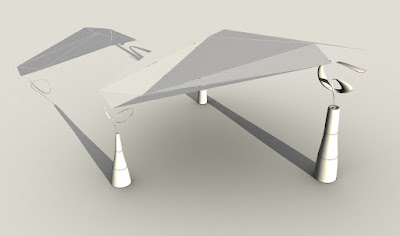Concepts Behind Pavilions
The data set I chose to study in the previous phase was the amount of Government spending on homelessness vs. the profit of the hotels, pubs and clubs industry. The stark contrast between the amounts of money encouraged me to create a place where the homeless can comfortable enter and feel safe. As a result of this, all my pavilions are open with no clear entry or exit. They also provide protection from the elements, whilst still allowing natural light. These factors clearly indicate that this is a public space.
Terminal Line
The terminal line is defined as a "temporary loss of smoothness in an undulating surface". Taking inspiration from the trees on site and using L-systems, this pavilion has smooth glass panels instead of tree leaves, which are triangulated and faceted to maintain the overall shape of a tree.
Model in Unreal Engine 4 Environment
Variation 1
Variation 2
Variation 3
Emergence
Emergence is based around naturally occurring structures, where the whole is greater than the sum of its parts. This pavilion uses hexagonal geometry, like bee’s wax. The size of the hexagons are randomly generated and grasshopper’s kangaroo plugin allows for the geometry to be shot out, and then they are attracted together, forming their own overall shape.
Model in Unreal Engine 4 Environment
Variation 1
Variation 2
Variation 3
Mobility
Mobility/morphogenesis is where geometry is created by using computational methods, in this case, simulating gravity. The anchor points used are the locations of trees, found by setting up a grid on the site. Negative gravity is then unleashed on the structure, causing it to rise.
Model in Unreal Engine 4 Environment
Variation 1
Variation 2
Variation 3














No comments:
Post a Comment